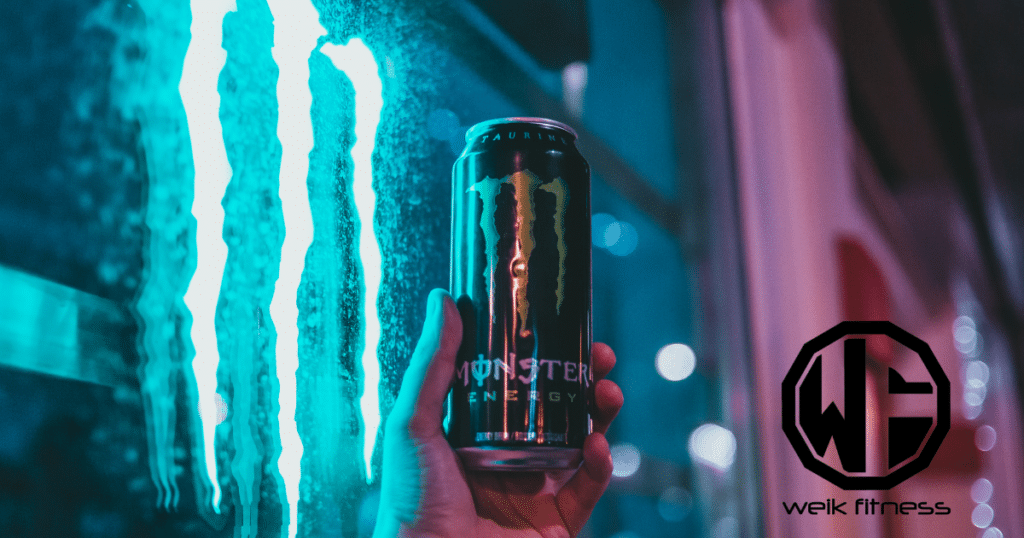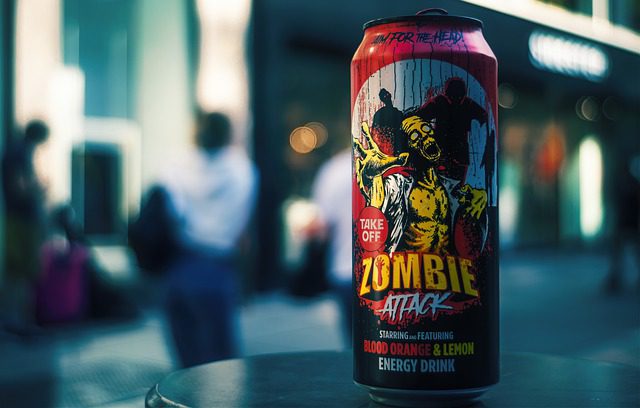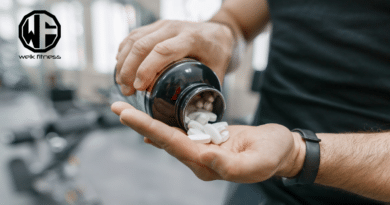Is Caffeine Overdose Really a Thing?
Are you one of those coffee lovers who look at your cup of coffee in the morning as if it were the most beautiful thing you’ve ever seen? Or someone who just cannot imagine starting the day or getting rid of the afternoon slump without a caffeine boost? You’re not alone. However, consuming too much caffeine can have consequences and lead to a caffeine overdose.
Ready to spill the beans on the topic (a little coffee/caffeine humor for you)? Let’s get into the details of caffeine and if there is such a thing as a caffeine overdose.
Disclaimer: This article is for informational purposes only and is not meant to treat or diagnose any condition. It is recommended that you speak with your doctor before starting any exercise program, changing your daily nutrition, or adding any supplements to your regimen.
Table of contents

What is Caffeine?
Caffeine is a natural stimulant found in various food and beverages like chocolate, coffee, black tea, green tea, energy drinks, and more.
Related Article: Drink MORE Coffee to Live Longer
Caffeine is produced in nuts, seeds, and the leaves of plants. It helps to stimulate the central nervous system, boost fat-burning, increase metabolic rate, elevate alertness, and reduce fatigue. But can too much lead to a caffeine overdose?
As per Statista, coffee is one of the most widely consumed beverages in the world. The worldwide consumption of coffee in 2020/2021 is around 166.63 million, 60 kgs bags, as compared to 164 million in the previous year.
How Does Caffeine Work?

Caffeine is a psychoactive drug that stimulates the central nervous system. When our body and brain work hard, our cells produce adenosine. Now, caffeine blocks the brain’s adenosine receptors and doesn’t let you know that you are tired or fatigued. That being said, the effects do not last for more than a few hours.
According to a study by the American Heart Foundation, each cup of coffee reduces the risk of heart failure or stroke by 8%, but there is a caveat — only if the coffee is caffeinated. But too much caffeine (more than 5 cups of coffee per day) can negatively impact you to the point of a potential caffeine overdose.
Here’s how much caffeine is present in various items (on average):
- Coffee (27-173 mg per 8 oz)
- Decaf (3-12 mg per 8 oz)
- Espresso (103-160 mg per 8 oz)
- Brewed tea (40-120 mg per 8 oz)
- Energy drinks (20-286 mg per 8 oz)
- Milk chocolate (6 mg per 1 oz)
- Dark chocolate (21 mg per 1 oz)
Consuming Too Much Caffeine Can Lead to a Caffeine Overdose

According to The Mayo Clinic Report, 400 mg of caffeine per day is a safe amount for adults, and adolescents should not consume more than 100 mg of caffeine per day.
Related Article: A Caffeine Study That Has Gone Dangerously Wrong!
Unfortunately, most people in the fitness industry push the envelope, as there are several pre-workouts on the market that contain as much as 400 mg per serving.
Your age, weight, genetics, and gender can play a role in how caffeine affects you and is processed by the body as well as your overall risk for a caffeine overdose.
Here are the symptoms of excessive caffeine consumption that can lead to a caffeine overdose:
1. Anxiety
Moderate levels of caffeine can boost energy levels, but a caffeine overdose may lead to anxiety. And even worse, it can cause panic attacks. So, if you ever feel nervous or jittery after having a cup of coffee or energy drink, take a look at your caffeine intake and try to cut it back.
2. Insomnia
A cup of coffee can help you to wake up in the morning and boost productivity, but that same coffee can disrupt your sleep. Need the solution? Simple! Avoid having coffee in the afternoon as it can reduce the duration and sleep efficiency (deep sleep time) from 90% to 74%.
Related Article: 3 Snack Options to Help Reduce Your Caffeine Addiction
Research shows that caffeine remains in our system for an average of 5 hours. However, it also depends upon the person and may range between 1.5 hours to 10 hours.
3. High Blood Pressure
Caffeine stimulates the nervous system, which in turn raises blood pressure if consumed in high doses. In case you already have a high BP, it is better to avoid too much caffeine.
4. Dizziness
It’s not uncommon to feel dizzy and lightheaded when you consume too much caffeine. This can be due to an irregular heartbeat or that your brain isn’t getting enough blood.
5. Digestion Issues
You have ever noticed that drinking a large cup of coffee can cause you to run to the bathroom? Or does a morning coffee lead to bowel movement? It is because of the slight laxative effect. Consumption of caffeine leads to the release of gastrin, which speeds up the activity in the colon. Also, a caffeine overdose may lead to loose stool and diarrhea.
How Can You Reduce Caffeine Consumption to Avoid a Caffeine Overdose?
Switch to Decaf
Of course, it may take time to get used to the taste but try to replace your caffeinated drink with a decaffeinated drink. A decaf coffee still contains antioxidants that are good for health.
Drink More Water
Stop quenching your thirst with caffeinated drinks, opt for water instead. Don’t like the plain taste? Try to add a few drops of lemon!

Say NO to Caffeine
Caffeine is addictive which can increase your risk for a caffeine overdose. Eliminating it is not as easy as it may seem. Cutting down on caffeine may lead to headaches and fatigue. So, go slow! Reduce consumption gradually.
Did You Consume Too Much? How to Prevent Caffeine Overdose
A caffeine overdose can be enough to send you to the hospital. Know your limits, and don’t try to consume excessive amounts of caffeine in order to get focused or energized. These days, people are slamming pre-workouts with the mentality that more is better — this is not the case with caffeine and stimulants!
Here are a few tips if you’ve gone overboard with your caffeine consumption and are showing some adverse effects:
Wait it Out
If the effects aren’t debilitating, wait it out. Try to relax (easier said than done) and focus on your breathing. Some of the effects can subside in as short as 90 minutes, but depending on how your body handles caffeine, a caffeine overdose could last upwards of 10 hours.
Hydrate
Start drinking water to help prevent dehydration, as you may find you’re urinating more than usual. Staying hydrated may also help your system process the caffeine and lessen the effects. Some people may notice nausea or an upset stomach during a caffeine overdose. Drinking water will help keep something in the stomach and may help reduce an upset stomach.
Get Active
If you have excessive jitters or anxiety due to a caffeine overdose, start moving. Go for a walk. You don’t need to do anything excessive, just get more active. Being that a caffeine overdose can cause an increase in blood pressure, it may be wise to avoid strenuous activities that would further increase your blood pressure.
Go to the Hospital
A caffeine overdose is not a fun experience. You may feel anxious, jittery, sick, suffer from an extreme headache, insomnia, increased heart rate, increased blood pressure, and more. If at any point your symptoms exacerbate, seek medical attention.
Know Your Limits and Don’t Overdo It to Avoid a Caffeine Overdose
Caffeine, if consumed in a reasonable amount, may prove to be beneficial for health, but a caffeine overdose can cause serious health issues. So, monitoring your caffeine intake and knowing what you’re putting in your body is extremely important. For instance, some people may take a fat burner, have a cup of coffee or energy drink, and follow it up with a pre-workout before they hit the gym. In such a scenario, you can easily take in more than 600 mg of caffeine in a short period of time. This can absolutely create the perfect storm for a caffeine overdose.
Related Article: Caffeine and Weight Gain — A Shocking Secret You Never Knew
Know your limits, and do not overdo your caffeine consumption. Those with health issues should pay extra attention, as a caffeine overdose can be fatal. Be smart about using caffeine and stimulants to ensure you stay safe while reaping the benefits caffeine can provide.


*Disclosure: This article may contain affiliate links or ads, which means we earn a small commission at no extra cost to you if you make a purchase through these links. These commissions help support the operation and maintenance of our website, allowing us to continue producing free valuable content. Your support is genuinely appreciated, whether you choose to use our links or not. Thank you for being a part of our community and enjoying our content.
PLEASE CONSIDER SHARING THIS ON YOUR SOCIAL MEDIA TO HELP OTHERS LEARN MORE ABOUT THIS TOPIC.





